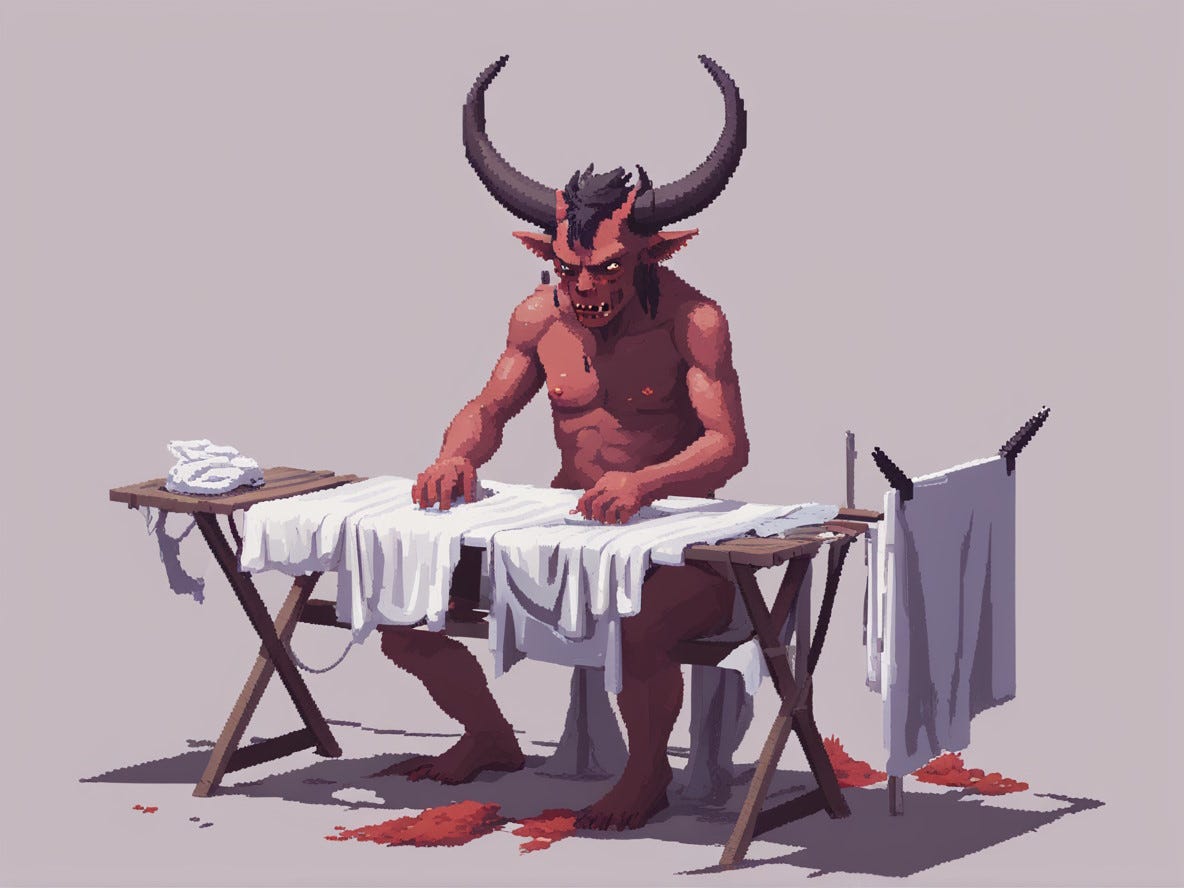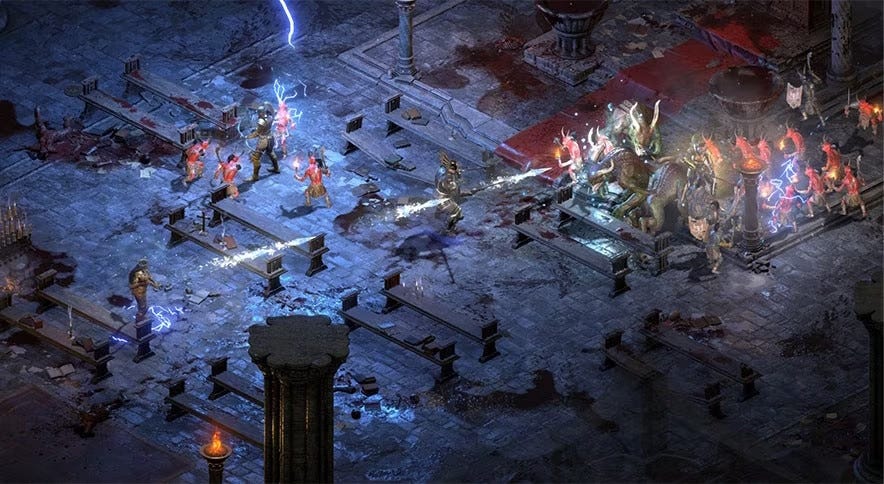Ironing the Wrinkles out of Gaming
I want to talk about the devil, specifically the venerated action-RPG video game series Diablo. It became a money printing machine by taking the dungeon-crawling elements of Rogue and combining it with the unrelenting pace of real-time gameplay (a total accident by the way). I mostly spent time with the sequel from 2000.
Any video game will have at least one “gameplay loop” which can be broken down into a series of choices the player can act upon. The loop in something like Tetris is simple to explain: there are falling blocks, and you have to choose how to rotate and where to position each piece in order to keep clearing lines. More complex games will have multiple overlapping decision cycles, covering everything down from the minutiae up to the meta. For something like Diablo 2, the first discrete decision you make is which character class to pick (say necromancer) but that’s followed by an extended meta-decision pupating over several gameplay hours about what kind of specialization (“build”) you want — do you want your necromancer to sling chemical warfare or to outsource all the work to skeleton contractors?
Zooming further in, you make various decisions about which dungeons to explore, which attributes to increase, or which equipment to buy. Zooming in even further to the second-by-second level, you’ll decide whether to attack Evil Hedgehog No. 37 on your left or Evil Hedgehog No. 43 on your right, whether to attack said hedgehog with a fire bolt or an ice bolt, whether to pick up the shiny gloves that just dropped or to abandon them to save inventory space, whether to chug a healing potion now or later. Click to move, click to attack, click to pick up, click to drop, click to cast, click to sell. Click click click click click click click click.
It’s an addicting treadmill made even more compelling by the rags-to-riches power fantasy journey you chart out and get invested in over however many dozens of hours. Skeleton magicians, sentient swords, stomping demons, and even insect swarms are there nominally to act as hindrances to your character’s quest, but their presence also provides you with the crucial ingredients to keep going. “Progression” in the gaming world has been abstracted into a sanitized currency exchange, whereby every murder can grant you self-improvement points or even equipment. Your character starts an untrained weakling with trash gear, and by the end you’re performing incomprehensible physical feats while decked-out in unimaginably rare bejeweled armaments.
Adorning all this is an enthralling spectacle that is hard to look away from. Your solo character will end up committing a mass genocide, where swarms of foes get cut down by whatever wizardry you happen to be wielding. Enemies performs their death animation in an exaggerated and dramatic fashion, clutching their chest in agony as a thick fountain of blood burbles outward. If you’re lucky, sometimes a full set of plate mail armor will spawn out of the corpse of a haunted bird and hit the ground with an emphatic thud to draw your attention. The aftermath of a battle shows a visceral trail of bloodied corpses with miscellaneous weapons & armor scattered around; like a medieval shopping spree gone horribly wrong. The game is essentially beating the shit out of loot piñatas and scrambling to wear the candy.
But there’s also oh so many non-choices — fake decisions with options so obvious that they only serve to sap your limited cognitive capacity. If you’re wielding a sword that gives you +3 to Smackdown skill or whatever and you find an identical sword that instead provides +4, there’s no reason not to jettison the former for the latter. You’ll regularly unearth literally broken equipment among the detritus, stockpiles so useless they’re not worth the scraps you get from hauling them back to town.
So here I am, 25 years after the fact, trying to chase after the nostalgia fumes I previously found so intoxicating as a teenager. You can still play Diablo 2 today with the Resurrected high-definition edition, where every skeleton bone has been lovingly re-rendered, but it’s just doesn’t hit in the same way. Paradoxically, it’s edged out by simpler contemporary options.
Here’s the thing about Diablo’s intense verisimilitude from days yore; there’s a fine-textured granularity that undeniably leaves your palms scuffed. Each particular meaningless decision you make, no matter how mindless, carves an imprint that gives the overall experience some emotional weight. Your computer mouse’s physical manifestation has a limited lifespan — every click shaves atoms off its internal mechanisms. Your finger’s neurotic twitches leave a mark on the world. There’s something to be said about the busy work adding some degree of the much-vaunted immersion; the problem is that it doesn’t seem worth the immense time investment.
The best illustration of what I mean is to compare Diablo to its greatest competitor: Vampire Survivors. It’s basically exactly like Diablo, except without any of the busy work. Instead of clicking to attack each time, you instead just stand there and your character automatically attacks at set intervals. Instead of choosing between which weapons and spells to attack, your character says “Yes” and just attacks with all of them. You still have to make some decisions, but they’re drastically narrowed to “Which handful of attacks do you want?” and “Which direction do you want to roam towards?”.
All the wrinkles, the busy work hidden between the folds, gets ironed out. You can take a journey that would otherwise take a dozen hours in Diablo, and compress it into a 15 minutes session in Vampire Survivors. All the high-minded strategic considerations of a veritable gamer, but without getting bogged down in the details and ending up covered in lint. The two avenues are basically the same thing, except one eats up way less of your precious time. Can you tell the difference?
It’s hard to turn down such a bargain, and I don’t know for sure if it’s worthwhile, but at least the spectacle continues to deliver. Maybe in a few years we’ll iron this out even further, and the top-selling video game of 2045 will give you the choice of pressing the left or right button, with appropriately compelling pomp and panache.





As you were describing Diablo, my first thought was "he'd like Vampire Survivors". And lo and behold, I didn't even have to bring it up.
Also, Vampire Survivors is like, $5 on Steam or free for mobile. Skip a coffee and get it if you want a shameless endorphin factory par excellence.
Finally, whenever Vampire Survivors comes up, someone must inevitably point out that its dev got his start programming gambling machines and decided to use his powers for good. All the lights, colors, and addictive gameplay loops, none of the devouring people's money beyond an initial payment and some fairly-priced DLCs.
Stardew Valley and Diablo in one week? I'll miss your law content but if you want to turn this into a gaming substack I'm down.